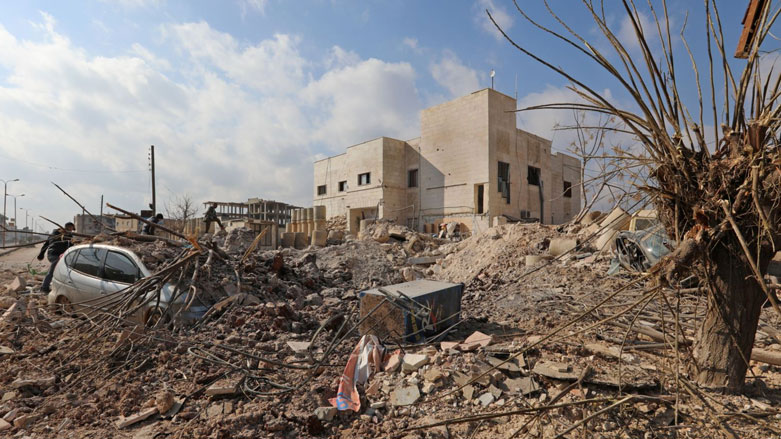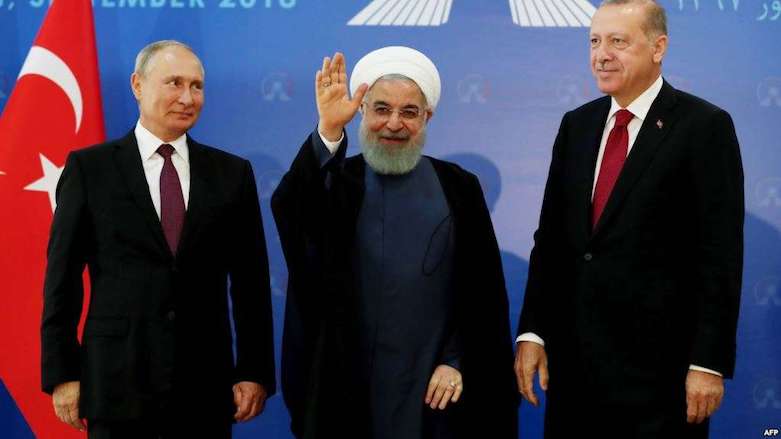Russia, Syria attack Idlib as US calls again for restraint

WASHINGTON DC (Kurdistan 24) - Russian and Syrian warplanes bombed western Idlib province on Tuesday, in apparent preparation for a Syrian offensive on the last rebel-held part of the country. The airstrikes followed a three-week bombing pause in the area.
At the same time, the US renewed calls for restraint amid efforts on multiple fronts, while Turkey bolstered its military presence along its southern border, even as it tried to use the crisis to reiterate complaints about the US partnership with the Kurdish People’s Protection Units (YPG) against the Islamic State (IS) in Syria.
The US moved to undercut a Russian-Iranian-Turkish summit planned for Friday in Tehran, in which the leaders of the three states will discuss the Syrian situation, including Idlib.
The US chairs the UN Security Council this month, and Nikki Haley, US ambassador to the UN, announced on Tuesday that the Security Council would also discuss the situation in Idlib on Friday, setting up a meeting to rival the Tehran summit.
In addition, the White House issued a statement, underscoring President Donald Trump’s tweet the night before, warning Syria, as well as Russia and Iran, against “recklessly” attacking Idlib.
The White House affirmed that the US is “closely monitoring the situation in Idlib province,” where “millions of innocent civilians are under threat of an imminent” attack.
“It remains our firm stance,” the statement continued, that if Syrian “President Bashar al-Assad chooses to again use chemical weapons,” the US and its allies “will respond swiftly and appropriately.”
Chairman of the Joint Chiefs of Staff, Gen. Joseph Dunford, similarly warned on Tuesday that a “major” Syrian offensive would cause a “humanitarian catastrophe” and suggested that Syria should take a more targeted, discriminating approach.
Dunford estimated that there are some 20,000 to 30,000 extremists in Idlib, and advised “more precise counterterrorism operations,” along with discussions among Turkey, Syria, and Russia, “would be the right approach,” rather than the “large-scale conventional operations” Damascus apparently intends to conduct.
Also on Tuesday, US Secretary of State Mike Pompeo spoke to Turkish Foreign Minister, Mevlut Cavusoglu.
“Both agreed that any Assad regime military offensive in Idlib would be an unacceptable, reckless escalation of the conflict in Syria,” the brief US readout of their phone conversation explained.
“The Secretary also stressed the importance of Turkey releasing Pastor Andrew Brunson”—whose continued detention remains a major concern of the Trump administration.
Speaking to reporters later that day en route to Pakistan, Pompeo further explained, “We are hoping that this can be resolved diplomatically.
“The Russians made a commitment” that “this was a de-escalation zone and this would be resolved through the Geneva process,” Pompeo continued.
“There’s no place” for the trapped civilians to go. The Russians say there are terrorists in Idlib, Pompeo noted. “That is a true statement,” and “we share their concern.”
But “to put the lives of all these innocent civilians at risk and create a humanitarian crisis” is “not the way” to do it, he said.
Pompeo’s newly-appointed Special Representative for Syria Engagement, Amb. James Jeffrey, was in Turkey on Tuesday, as part of a tour that includes Israel and Jordan.
In Ankara, Jeffrey met Cavusoglu, as well as Defense Minister, Hulusi Akar.
Shortly after Jeffrey’s appointment, State Department Spokesperson, Heather Nauert, explained that he would “serve as the Secretary’s advisor for and the department’s primary contact on all aspects of the Syria conflict, apart from the Syria components of the D-ISIS campaign, which will remain with the Special Presidential Envoy for the Global Coalition to Defeat ISIS, Brett McGurk.”
In other words, Jeffrey handles Syria west of the Euphrates and focuses on the political process of forming a new Syrian government. McGurk handles Syria east of the Euphrates, where the coalition is focused on defeating IS’ last remnants and then ensuring that IS does not return to the territory it once controlled.
The Syrian Democratic Forces (SDF) have been the main partners of the US-led coalition in ousting IS from Syria, and the SDF’s leadership is provided by the Kurdish People’s Protection Units (YPG.)
The US regards the partnership as successful, and senior US military officers routinely describe the SDF-administered northeast as among “the most stable areas” of Syria.
Turkey, on the other hand, has repeatedly complained about that partnership, claiming that the YPG is the Syrian branch of the Kurdistan Workers’ Party (PKK), which both Ankara and Washington consider a terrorist organization.
Turkey’s official Anadolu Agency reported that “in a closed-door meeting” with Jeffrey, the Defense Minister “expressed Turkey's discomfort at the terrorist YPG/PKK presence in Syria.”
The YPG is not in western Syria. It is in eastern Syria, and that area does not fall within Jeffrey’s brief, as Nauert stated.
Asked to explain why Jeffrey would discuss matters outside his brief, the Pentagon advised asking the State Department. The State Department, however, did not respond to emails about the issue.
So there is a question mark that hangs over Turkey’s account of the meetings in Ankara with Jeffrey.
Notably, the US embassy there issued a read-out of Jeffrey’s meetings. It said nothing about the YPG or issues related to eastern Syria.
Visit by Ambassador James F. Jeffrey, Special Representative for Syria Engagement, to Turkey - September 4, 2018 pic.twitter.com/sjavMTsFA8
— US Embassy Turkey (@USEmbassyTurkey) September 4, 2018
Rather, the embassy’s read-out deals entirely with issues related to Syria’s political future, which is what Jeffrey is responsible for, as Nauert explained.
Editing by Nadia Riva

